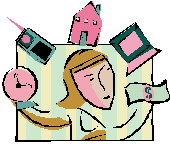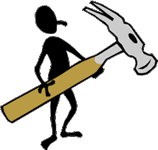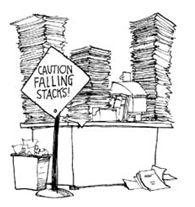|
Stressed to the Max?
Workable Solutions in Today’s Economy

Striking a balance between work
and family life has become a major issue in our culture. Although there are many factors that have created stress, I believe that our global economy, combined with technology, have escalated the hurried pace of life that seems so prevalent in our day-to-day lives.
Think about it. If you are in the US or Canada and you’re doing business with someone in Europe or Australia, their workday may be during your family time, and vice versa. If you are going to be responsive to a customer’s needs across the globe, you may feel a need to extend your work hours to accommodate them. Combine that with the ability to reach someone any time of day or night -- no matter where they are (even on vacation) -- and you have a recipe for very little down time, unless you self-impose some limitations on your availability.
In addition, in Western culture our standard of living has gone up considerably over the decades. My grandparents’ generation was content with being a one-car family, and it was a real luxury for them to own a single black-and-white TV. Most of our technology did not even exist (personal computers, wireless communications, electronic gadgets and games). Travel was by bike, car, or train. In today’s economy, “essential” purchases are defined very differently than they used to be. In other words, we need more money to cover the “basics” as we know them today.
It’s no wonder we’re such a stressed out society!
Here are some alarming statistics:
- Among European workers, 6 out of 10 suffer from work stress.
- Among
US employees, 1 in 3 feels chronically overworked.
- More than 2
of every 3 Canadians find it difficult to balance family life with
work.
- Estimates report that over 600 million workers (22% of the
global workforce) spend more than 48 hours a week at their
job.
- In Japan, about 10,000 people die annually from overwork
(called “karoshi” – death from overwork).
These long work hours can result in strained relationships, poor
parenting, divorce, and bad health. Chronic overwork has been linked
to obesity, alcoholism, heart disease, workplace accidents, drug dependency,
anxiety, fatigue, depression, and many other stress-related disorders.
Are you working too hard? If not, you may be among the millions who
are presently unemployed or underemployed.
Although we should work to live -- not live to work -- in these challenging economic times,
it has become a greater challenge to balance work with rest and leisure
while also caring for the needs of a family and paying the bills.

So what’s the solution to this
runaway merry-go-round we seem to be on? How do we get off long
enough to smell the roses…or to even notice that there are roses
to smell?
It’s time to think outside the box!
What can you do to build more balance into your life, while also
doing what’s necessary so you can pay the bills?
I’ll share four ideas that will assist you in getting off the out-of-control
merry-go-round:
1.Reduce expenses.
2.Increase income or barter.
3.Plan for the future.
4.Use time more productively.
REDUCE EXPENSES

You may be surprised how much money you spend monthly on
habits that cost just a few dollars here and there. This “little stuff” can collectively
add up to a lot of money – money that could be directed in ways that
could reduce your stress and provide a better quality of life for
you right now.
Do you have a written budget? Do you know where your money is going?
If not, it’s time to start paying attention. Here are some common
examples of undetected “leaks” in the budget:
- Fast food or going out to eat frequently when you are not traveling.
- Ordering lots of extras when dining out (beverage, appetizer,
dessert, etc.). These extras can easily double your dining bill,
and they also significantly increase your caloric intake.
- Alcohol,
tobacco, or recreational drugs
- Buying prepared beverages (coffee,
lattes, etc.) instead of making your own
- Purchasing things at the store, in a catalog, or advertised
on TV that were not on your list (impulse shopping)
- Signing
up for a “free” 30 day trial and forgetting to cancel it before the
end of the 30 days if you don't want it
- Subscriptions to publications you don’t have time to read
- Monthly fees that show up on your credit card for services
you have subscribed to – are they valuable or necessary?
Are you using the service?
- Books you purchase and don’t read more than once or at all
(could be borrowed from the library for free in the future)
Regardless of what your income is, do you consistently
put a portion away in a savings account each month so you have something
to fall back on in case of dire emergency? When you cut back on some of the
things on the list above, you’ll be able to redirect that money to
a savings account.
Do you plan ahead for errands, so you are economizing on
your time, gas, and wear-and-tear on the car? What about walking or riding your
bike to run some errands or attend some activities? This is good for
your health and can save some money, so there’s a double benefit here!
Do you use coupons or take advantage of discount specials? With the Internet, it’s very easy to do comparison
shopping for the same item, and you can save quite a bit of money
doing so. Be sure you pay attention to variables like the cost of shipping & handling if you are comparing the sale price of something you are buying online.
Do you save energy when you can? Do you turn lights and appliances
off when you are not using them? Do you have a thermostat that changes
temperature when you are away at work or sleeping?
Keep a journal for one week and jot down every dime you spend. At
the end of the week, add up the total for common items so you have
a clear picture of where your money is going. You may be surprised!
As you review your habits, ask yourself these questions:
1.What do I want to START that I have not been doing?
2.What do I want to STOP that does not serve me to continue doing?
3.What do I want to CONTINUE doing?
GENERATE INCOME OR BARTER

If finances are tight, you may hear yourself saying, “I can’t afford
to get help with the chores and responsibilities that contribute to
me feeling exhausted.” If you had to pay for these things out-of-pocket,
it may not be in the budget. But there is another way.
All of us have certain activities that we love doing. They bring
us pleasure and feel effortless when we do them. It doesn’t feel like
work when we do them because we enjoy the activity. We also have other
activities that we dread doing and those feel very much like work.
Find someone to barter with -- you do something for them and
they do something for you of equal value.
Example: You love to cook and your neighbor dreads cooking. Your
neighbor is an amazing photographer and your son is graduating from
high school and needs some senior portraits. You barter services.
Your neighbor takes the photos and you double some recipes you are already cooking for your family, so you can provide some ready-to-heat meals for the neighbor.
If bartering is not something you want to do, perhaps someone is
happy to pay you for things you love to do. These funds will enable
you to hire someone else to do the chores you don’t enjoy.
Below is a list of some activities to help get you started. I suggest you make two lists of your own: (1) Activities you’d enjoy
doing; (2) Activities you want someone else to do. Then share your
two lists with others and see what you can either barter or hire/get
paid to do.
Here are some ideas:
Babysitting, child care
Sewing – mending, altering, making new clothes
Food preparation, baking
Laundry, ironing
Quilting, knitting, pottery, art, crafts (making gifts for others)
Upholstering
Bookkeeping, typing
Computer repair, computer building, networking
Teaching and training on software, computer skills
Creating and maintaining websites
Ghostwriting (writing something that someone else publishes),
editing
Hairdressing
Massage
Photography
Plant care, aquarium care for offices, banks,
lobbies, shopping plazas
Pool and spa services and maintenance
Outdoor cleaning: pressure washing, roof and gutter cleaning,
window cleaning
Car wash
De-cluttering & organizing
Cleaning stores, homes, offices, apartments
(after construction, after fires, after
move out)
House cleaning
Property management
Boarding someone in an extra room
Offering a Bed & Breakfast in a guest cottage
Moving
Gardening, yard work
Farming: planting crops, picking fruit, harvesting
Pet grooming & exercise
House sitting, pet sitting
Repairs: bikes, cars, appliances
Plumbing or electrical work
Handyman, home repair, remodeling, house painting
Home decorating
Personal assistant (errands, shopping, travel arrangements,
setting
appointments,
supervising repair or delivery people, etc.) Transportation services (to and from airport, child
transport to after school activities, etc.)
Taking things to the dump or to a non-profit
thrift shop for donation
Some of the activities listed above may require that you be licensed,
so be careful that you don’t offer something you are not legally qualified
to offer for pay or trade with someone else. You also need to be aware
of liability issues.
If you need professional work done by a dentist, orthodontist, doctor, chiropractor, lawyer, etc, and you cannot afford the work, ask if they would consider bartering for a service you provide.
Some of these activities can be done virtually. In other words, you
could do them or have them done for you by someone who is not in your
geographic area, so think of family or friends you know from afar
who you could barter with.
For much of the work mentioned above, ads can be placed free of charge
in weekend shopping flyers or on supermarket notice boards. You can
also place free ads at www.craigslist.com or send an email out to
groups of people you know locally. Social networking is another way
to spread the word about services you want to offer or need help with. Be careful how much personal info you divulge until you build some trust. Never post personal information, such as where you live.
What strategic alliances can you form with others that will be mutually
beneficial? Think outside the box!
PLAN FOR THE FUTURE

“If you keep doing what you’re doing,
You’ll keep getting what you’re getting.
One definition of insanity is to keep doing the
same things and expecting different results.”
--Stephen Covey
Once you have alleviated some of the immediate time and financial
pressures you’re currently experiencing, it’s time to come up with
a long-term solution. The ideas above are only a quick fix. I just
read an outstanding book by Robert Kiyosaki, author of best-seller Rich
Dad Poor Dad .
In his brand new book, The
Business of the 21st Century .
In his brand new book, The
Business of the 21st Century ,
here are some excerpts from Chapter 1: ,
here are some excerpts from Chapter 1:
When I was a kid, my parents taught me the same formula for success
that you probably learned: Go to school, study hard, and get good
grades so you can get a secure high-paying job with benefits—and
your job will take care of you.
But that’s Industrial Age thinking, and we’re not in the Industrial
Age anymore. Your job is not going to take care of you. The government
will not take care of you. Nobody’s going to take care of you.
It’s a new century, and the rules have changed.
My parents believed in job security, company pensions, Social Security,
and Medicare. These are all worn-out, obsolete ideas left over from
an age gone by.
The corporate myth is over. If you’ve spent years
climbing the corporate ladder, have you ever stopped to notice
the view? What view, you ask? The rear end of the person in front
of you. That’s what you get to look forward to.
If you want a solid future, you need to create it. You can take
charge of your future only when you take control of your income
source. You need your own business.
Many of us were promised this dream: Go to college
and get a degree, and that will secure you a good job. Before you
continue reading, I want to emphasize that I am college-educated
and I would not trade that for anything. But simply going to college
does not guarantee a well-paying and secure job. How many people do you know today who bought into this dream who
are currently unemployed or under-employed? Once I graduated, I was
disappointed to discover that my college degree did not yield the
job I had hoped for. My first job out of college paid me $8600 a
year plus benefits. My husband and I had to live on that while also
making payments on my educational loans and getting him through medical school. Four years later when he
graduated and I left that job, I was making a whopping $10,400 as
a college graduate!
Today’s college graduates are facing some harsh realities as they
look for a job in an economy where even experienced workers are
being laid off, or jobs are being outsourced to overseas workers
for a fraction of the pay most of us would be willing to accept
for the same work.
Do you see the picture I’m painting here? All I want you to do
is think about the big picture.
In order to make more money, you have to do something different.
And I don’t mean working more hours on the job. Western society
has been doing that for years and nothing has changed much. Your
lifestyle will never change if you don’t change what you’re doing.
I’m NOT saying that you should
stop working a job you love to start your own business. For example, my husband teaches medical students at a university, and he loves what he does. I asked him one day, "If we were independently wealthy, would you do anything different professionally?" He said he would keep teaching, because he loves it.
What I AM saying is that it’s time to put a Plan B
in place. I used to believe that starting my own business would
require hundreds of thousands of dollars and working at it full time. Just over four years ago I started a business on the side for
$400 and by my second month in business I was profitable.
In last month’s article, Undervalued?
Leverage the Skills You Already Have!, I addressed the importance of leveraging your time. You can
only work so many hours in the day, so when you trade time for dollars (in your own business or working for someone else),
you put a cap on how much you can earn.
The wealthy have figured out how to leverage their time, and that’s how they’ve become
wealthy. I have found a way to leverage my time and I encourage
you to do the same. If you’re feeling discouraged and defeated by
the current economic climate, read Robert Kiyosaki’s book to learn
more about a business model that is rapidly growing in popularity,
and for good reason. Millions of people are adopting this model,
which I have adopted over the last four years as part of my long-term
wealth generation plan. Kiyosaki’s book, The Business of the 21st Century , will open your eyes to incredible
possibility! , will open your eyes to incredible
possibility!
If you’re curious how I have completely transformed my ability
to generate income in this economy, click here and I’ll share how
I’ve done it.
USE TIME MORE PRODUCTIVELY
Check out my FREE webinar below. I have been teaching this monthly class since 2003, and it continues to be my most popular webinar. The next one is coming up soon, so register today!
Need Help Getting Organized?

This FREE webinar will help!
Is this you?
- Do you often wonder where the time went?
- Does your to-do list keep getting longer, even though
it feels like nothing is getting done?
- Have you totally given up on keeping a to-do list? (After
all, you're never able to cross anything off, so what's
the point?)
- Do you have trouble finding what you need?
- Do you feel like you’ll NEVER catch up?
If you answered "yes" to
any of these questions, we can help out by teaching
you some powerful techniques that will help you increase your
personal and professional productivity. In fact, don't be surprised
if we can add an hour or MORE to your day EVERY DAY. Imagine
what you would do with an extra hour each and every day. That
is an additional 365 hours or over nine 40 hour work weeks of
extra time. Think of this next time you make the statement, “I
wish I had more time”.
Here's what you'll be able
to accomplish when you attend my upcoming webinar
and put what you learn into practice:
- Set your priorities and focus on what matters most (do this
and you'll be amazed at how fast you can start crossing things
off your to-do list).
- Remember important follow-up tasks BEFORE rather than AFTER… (wouldn't
that save tons of stress not to mention embarrassment?).
- Efficiently handle mail, filing, returning phone calls and
other repetitive tasks so you'll have more time to do the things
you LOVE to do.
- Streamline information management and communications (no
more time wasted on information that's "interesting but
not relevant” to what you need NOW).
- Relax and enjoy a less cluttered environment.
Register for a FREE monthly
90-minute webinar.
Next webinar is Tuesday, May 4.
Buried in Paper:
Learn a simple five-step process to help you eliminate paper pile-up forever
|
|
Do you stay in touch with important people
in your business and personal life?

Did you know that
for every month that your customers and prospects do not hear
from you, you lose 10% of your influence over their buying
decisions and referrals of new customers? That means in 10
months you have lost 100% of your influence. Why? Because they
have already forgotten about you. Click here to
learn a simple secret to attracting all the business you want!
Do you have important people in your life you have not been
in touch with for a while? For those people you see all the
time, do you take them for granted? When was the last time
you told them you loved and appreciated them? Don't put it
off any longer! You never know when today could be your last
chance.
There’s no time like the present to
send a note of appreciation, sympathy, encouragement, congratulations,
or to remember someone on a special day. Check out a wonderful
high-tech/high-touch tool that enables you to send a real paper
greeting card to someone you care about, without leaving your
home or office. The cards are very affordable (less than a
dollar) and you don't have to spend your gas and time driving
to the card store and post office to get it in the mail. .
Click here to
try it for free! |
 |
Fill out this form to receive my
FREE report
7 Secrets
to
Fabulous
Follow-up.
*Required field |
|
|

